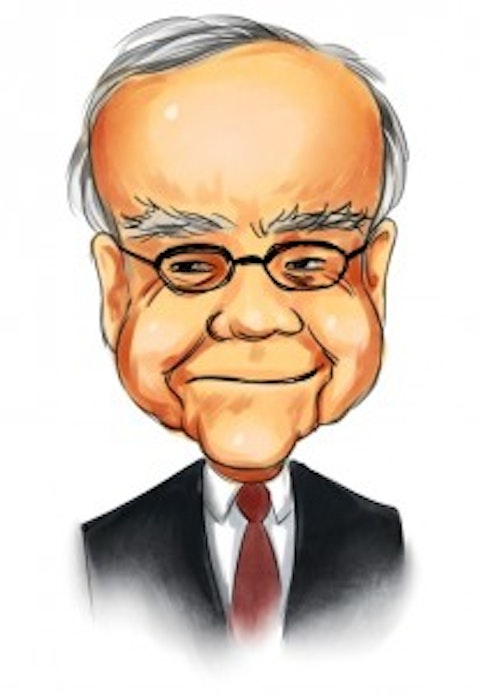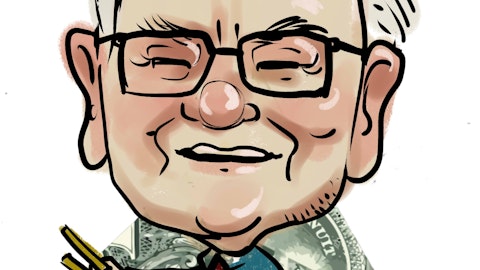
In this article, we are going to take a closer look at a few large-cap stocks with significant insider purchases recently. All companies have market capitalizations of at least $10 billion, and the insider transactions are reported to SEC from April 30 to May 4.
The Coca-Cola Company (KO): Two insiders bought Coca-Cola shares on April 27. Director Barry Diller purchased 264,000 shares at $76.98 per share while Director Evan Greenberg bought 6,507 shares at $76.75 per share. The transactions are reported to SEC on May 1. Though a few other insiders sold Coca-Cola stocks over the next couple days, Coca-Cola still closed at $77 per share on May 4.
Coca-Cola is wildly popular amongst the hedge funds we track. Billionaire Warren Buffett is the most bullish fund manager about Coca-Cola. His Berkshire Hathaway had about $14 billion invested in this position at the end of last year (check out Warren Buffett’s top stock picks). Boykin Curry, Cliff Asness, and Louis Navellier are also in favor of Coca-Cola (see Louis Navellier’s favorite stock picks).
For the first quarter of 2012, the company reported net operating cash flow of $493 million, up 7.64% from the same quarter last year. The strong cash flow generated by the company is likely to be partly returned to its shareholders through dividends and share repurchases. As a “Dividend Champion”, Coca-Cola has been raising its dividend payments for 50 consecutive years. Earlier this year, the company increased its quarterly dividend from $0.47 to $0.51 per share. Currently, it has a dividend yield of 2.65%. Coca-Cola’s low payout ratio of 51% and stable expected earnings growth rate of 8% indicate that the company has the ability to further raise its dividends in the future.
In addition to paying dividends, Coca-Cola has also been benefiting its shareholders by repurchasing its outstanding shares. In 2012, the company is planning to buy back $2.5 billion to $3.0 billion worth of its stocks. The repurchase will contribute to the growth of the company’s EPS. Analysts expect Coca-Cola’s EPS to be $4.10 in 2012 and $4.50 in 2013, up from $3.84 in 2011. With regard to valuation, Coca-Cola is trading on par with its peers. Its forward P/E ratio is 18.8, slightly lower than the industry average of 19.50 but a bit higher than the 16.30 for its main competitor Pepsico Inc (PEP). We like Coca-Cola’s international footprint, especially its presence in the emerging markets.
Hess Corp (HES): Hess was also purchased by two insiders recently. John Hess, Director at Hess Corp, purchased 48,000 shares of the stock at $52.0017 per share on April 30. Another director, John Mullin, bought 10,000 shares at $53.6257 per share on May 3. The stock closed at $50.94 per share on May 4, a day on which the market was also down 1.64%. Hess is also quite popular among the hedge funds we track. As of December 31, 2011, there were 32 hedge funds reporting Hess in their 13F portfolios. The most bullish money manager about Hess is Ken Griffin. His Citadel Investment Group had $81 million invested in this position at the end of the fourth quarter. Steven Cohen and Israel Englander are also bullish about Hess (check out Israel Englander’s top stock picks).
Hess has been restructuring its operations over the past few years, focusing more on its exploration and production business. Last year, the company sold its natural gas production and transportation assets in the UK North Sea. Hess had capital expenditures of about $7.5 billion last year, including nearly $1.34 billion for purchasing stakes in the Shale land in eastern Ohio. The deal is expected to largely boost Hess’ production and improve the company’s presence in the unconventional Shale play. In 2012, Hess plans $6.8 billion in capital expenditures, mainly in exploration and production. Like many other energy stocks, Hess is also trading at low multiples. Its forward P/E ratio is about 7.83, considerably lower than its industry average of 12.11. Hess’ main competitors include Occidental Petroleum Corp (OXY) and Suncor Energy Inc (SU). Hess is relatively undervalued compared with both of them. Occidental Petroleum’s forward P/E ratio is 10.5 and Suncor’s is 9.25.
Other Companies: Insiders also reported buying 30,000 shares of General Electric Company (GE) and 2,000 shares of CME Group Inc (CME) over the past week. Financial stock CME has a forward P/E ratio of 15.5, a premium to the industry average of 10.23, but the company’s earnings are expected to grow at an average of 12% annually over the next couple of years. We also like the company’s diversified portfolio of products and strong cash flow generation abilities. We like General Electric too. It is the most popular conglomerate stock amongst the hedge funds we track. Forty hedge funds, including Warren Buffett’s Berkshire Hathaway, reported owning General Electric in their 13F portfolios at the end of last year. The company also offers decent dividends. Its current dividend yield is 3.52% and its payout ratio is about 50%.





